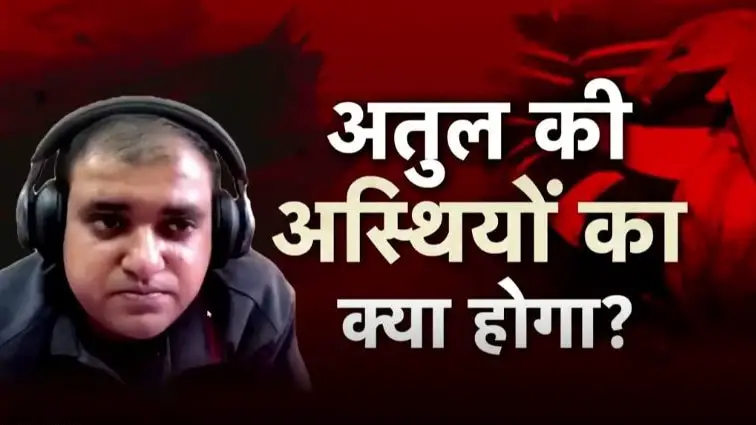AI Engineer Suicide Case: Will Atul Subhash’s last wish remain unfulfilled, will the court be able to give justice? – Bengaluru AI Engineer Suicide Case Justice for Atul Subhash Uttar Pradesh Family Court opnm2

It is said that the last wish of a dying person must be fulfilled. AI engineer Atul Subhash, who committed suicide in Bengaluru, has told his wish to the entire country before dying. His same wish is currently in the hands of his brother, sealed in an urn in the form of ashes. According to Atul’s last wish, it should not be immersed until he gets justice. His wishes do not stop here. He further says that if the court is unable to provide justice, then his ashes should be thrown into a gutter outside the court.
Atul has expressed two wishes regarding his ashes. First, the ashes should be preserved until the decision is taken. If the second decision is not in favor then it should be thrown out of the court. Atul has already said goodbye to the world after telling his wish. Now, if anyone in this world can fulfill both his wishes, then it is only those two people. One is the court and the other is the family. At present the family has given its initial opinion regarding the ashes. His younger brother Vikas Modi has said that he will preserve Atul’s ashes till he gets justice.
Now the court is left. That means whether Atul’s last wish will be fulfilled or not is in his hands. Because Atul has sought justice from the court itself. Not only has he demanded justice but he has even said that if the court is unable to give justice, the ashes should be thrown into a gutter. According to law, a case is filed against the people whom Atul has held responsible for his death under Section 306. That means a case of abetment to suicide. Under this section the maximum punishment is 10 years. But some decisions of the Supreme Court can become a hindrance in this matter.
On December 10, the Supreme Court, while overturning a decision of the Gujarat High Court, had said that no one can be held guilty in a case of abetment of suicide unless it is proved that he directly or indirectly caused the person’s death. Not connected to. In such a case, the timing of death also proves to be an important evidence. In fact, in the case of suicide of a wife in Gujarat, a case was registered against her husband and in-laws for abetting suicide. The lower court and High Court of Gujarat had sentenced the culprits to 10 years imprisonment.
What does Section 306 of IPC say, what is the punishment?
The Supreme Court overturned that decision and acquitted him. In such a situation, it seems that none of Atul’s in-laws should be held responsible for his death. Wife, mother-in-law, brother-in-law, uncle, no one will indulge in the trend of instigating Atul to commit suicide. The Supreme Court has clearly stated in one of its decisions that under Section 306 of the IPC, only those people can be punished who directly instigate someone to commit suicide. There should also be strong evidence that the instigator was directly connected to the person’s death during the suicide.
The Supreme Court has clearly said in its decision that in case of husband and wife, both are living separately. One of them may commit suicide while he is away. So in such a situation it cannot be a case of abetment to suicide. If there is a fight between a husband and wife and even after several hours or days of the fight, if either of them commits suicide, it will not be considered a case of abetment to suicide. The court believes that in a case of instigating someone to commit suicide, there should be strong evidence as to how he instigated it.
Atul Subhash’s in-laws may get ‘supreme’ relief!
According to this decision of the Supreme Court, Atul’s in-laws are going to get a big relief. Atul was living in Bengaluru separately from his wife Nikita for the last three years. In these three years, except for meeting on a date in the court, both of them never met alone. Their relationship was bad for the last three years. Now in such a situation, if Atul commits suicide, at least a case under section 306 will not be filed against Atul’s in-laws regarding the time of that suicide. There is no direct link of Atul’s in-laws to his suicide.
Atul himself has left proof of this. By pasting the video recorded before his death, a 23-page suicide note and a list of his last 32 tasks before liberation. All this evidence will go against Atul himself in the court. Because through this evidence, Atul himself made it clear that there was no direct link with his in-laws before the time he was going to commit suicide. Nor did he directly provide anything for the suicide. However, Atul had definitely mentioned at one place in the suicide note and video that on one date inside the court, his wife Nikita had asked him that why don’t you commit suicide. The judge laughed at this.
Will Atul’s ashes kept in the urn be thrown into the gutter?
Here Atul is directly telling that in a way his wife had instigated him to commit suicide. So, on the basis of this evidence, is not a case made against Nikita under Section 306 of the IPC for instigating Atul to commit suicide? So the answer is probably not. Because according to the decision of the Supreme Court, even if Nikita had said such a thing, she had said it a year or two years ago. That reason cannot be justified for Atul’s suicide after a year or two. Before his death, Vaise has made allegations like extortion, threats, mental torture etc. against his wife and in-laws.
It is possible that Atul’s in-laws may also be held guilty in one of these cases. But even this does not provide justice to Atul. Because her biggest demand was that her in-laws were responsible for her death. According to the Supreme Court’s decision, the in-laws cannot be punished for the death. In such a situation, will Atul’s last wish remain unfulfilled? Why will the court not be able to give him justice? The biggest question is that in such a situation, whether the court or not Atul’s own family will be able to fulfill his wish? Will Atul’s ashes kept in an urn be thrown into a gutter in front of the court? All these questions are very important, the answers to which would have been understood in the lesson from the above examples.




